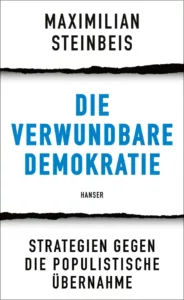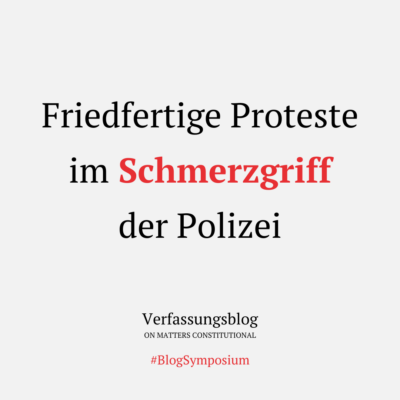Vulnerable Democracy
Monday next week, the book that I have been working on with the support of our Thuringia team over the last few months will finally be published. “Vulnerable Democracy” (“Die verwundbare Demokratie”) is the title, Hanser is the name of the publishing house, and the first printed copies have been delivered to us this week. If you’ve ever written a book yourself, you will understand my delight. If you haven’t, you will too, perhaps.

In this book, I attempt to focus on authoritarian populism as a strategy: It is not about policy goals, about which one could and should argue with those who pursue them. It is not about political interests, wishes and preferences. It is about a strategy that aims to establish an authoritarian regime. Those who strive for an authoritarian rule that is immune to democratic competition, rule-of-law controls or public critique need no coup d’état any more nowadays. Far more effective and less risky is the abuse of the institutions of liberal democracy themselves to achieve this goal. That is what the authoritarian populists are doing, all over the world, including, and with alarming success, in Germany.
The key to this is the identitarian, essentialising concept that the authoritarian populists create for themselves and their supporters of the people (“Volk”), from whom, as is well known, all state power emanates in German democracy. If the people is not understood as an open, legal concept that is constantly reproduced anew in democratic procedures, but as a given fact that precedes all law and all politics, natural, homogeneous and identical to itself – then the institutions are no longer needed to reproduce the demos, but can be converted into instruments for gaining and maintaining power and for the exclusion and disenfranchisement of vulnerable minorities.
This conversion requires considerable legal skills. Authoritarian populists possess these skills to a remarkable extent, as can be seen not only in Hungary. Those who should and want to oppose this strategy, as functionaries and decision-makers within the institutions, but also as parts of the broader democratic public in general, are often lagging behind in that respect, if only because they do not share this instrumental view of the institutions in the first place and therefore find it difficult to even imagine these scenarios. They are all the more likely to being caught off guard, wrong-footed and facing a fait accompli. Once they have experienced what is being played, possibly first-hand, it may very well be too late to fight back.
The aim of the Thuringia project is to reduce this gap. Over the past year, we have analysed how this strategy could work when it comes to the institutions of the Free State of Thuringia. To this end, we have held countless interviews to generate knowledge about what is coming to Thuringia and all of us now or in the near future. We have looked at how the authoritarian populists could make use of their minority and participation rights from within the opposition in order to advance their strategy. We have looked at how they can utilise the municipal government, the civil service, the security apparatus and the judiciary for their own purposes. We looked at how they could subjugate the media, freedom of opinion and assembly, freedom of art and science, education and culture to the goal of reproducing their identitarian popular mirror image. We also looked at who could take action against this, particularly at the federal level, and how a federal intervention against an authoritarian state could look like.
This book contains what we found out. If you pre-order it here now, you will have it in your letterbox in time for the publication date.
This editorial will go into a summer break now. All the best, enjoy the summer, and bon courage!
Max Steinbeis
++++++++++Anzeige++++++++

Art, science, research and teaching are free. A small contribution to the defence of our fundamental rights.
The shirt is now available in our store.
++++++++++++++++++++++++
*
The Week on Verfassungsblog
Since the start of the Hungarian Presidency of the Council of the European Union (EU), the Hungarian Prime Minister Viktor Orbán pursued an active foreign policy. He went to Kyiv for a meeting with Ukrainian President Volodymyr Zelenskyy, made a surprise visit to Russian President Vladimir Putin in Moscow, attended an informal summit of the Organisation of Turkic States hosted by Ilham Aliyev, President of Azerbaijan, and then flew to Beijing for a meeting with Chinese President Xi Jinping. Orbán’s self-declared ‘peace diplomacy’ illustrates – once more – the challenges surrounding the EU’s external representation. PETER VAN ELSUWEGE explains why Orbán’s actions are problematic in view of Hungary’s obligations under the EU’s Common Foreign and Security Policy (CFSP).
After last Sunday’s elections, the French Fifth Republic steps into uncharted waters. In the short term, France’s role at the heart of EU integration and as a key supporter of Ukraine remains steadfast. This stability is impressive, given most predictions. GIOVANNI CAPOCCIA argues that this new phase of French politics will be fragmented and fluid, demanding a recalibration to find a stable equilibrium while countering the far right. French moderate parties face a tough road ahead. Their success or failure will not only shape France’s future but also reverberate beyond its borders. CYPRIEN FLUZIN has also looked at the looming political instability in France and played out some scenarios shortly before the elections. The current political landscape, Fluzin argues, presents one of the greatest stress tests for the French constitution.
The classical Hobbesian critique of international law famously asserts that “covenants, without the sword, are but words.” Accordingly, given Israel’s persistent non-compliance with the ICJ’s provisional measures in South Africa v. Israel, on 29 May 2024, South Africa requested “the Security Council to give effect to the Court’s judgments” under Article 41 of the ICJ Statute. MISCHA GUREGHIAN HALL shows why the discussions on whether the Council lacks the statutory authority to supervise and enforce the Court’s provisional measures under the ICJ Statute overlook the broader point. Namely, the Order on provisional measures is the perfect legal evidence for the Council to trigger its powers under Chapter VII and thus end the humanitarian calamity in Gaza.
As the storm of ICC Chief Prosecutor Karim Khan’s request for arrest warrants loomed and landed on Israeli Prime Minister Netanyahu and his Defence Minister Yoav Gallant, ardent supporters of Israel within the U.S. and U.K. governments and beyond appear to have seized upon a jurisdictional objection. U.S. Secretary of State Antony Blinken is reported as saying that the “ICC has no jurisdiction over this matter.” The U.K. Foreign Secretary David Cameron is reported to have said the same thing. The same objection was made by the Russian government against the warrants that the ICC issued for the arrest of President Putin and his commissioner for children’s rights, Maria Alekseyevna Lvova-Belova, for war crimes in Ukraine—notwithstanding that Russia, like Israel, is not a party to the Rome Statute. CHILE EBOE-OSUJI, former President of the International Criminal Court, explains why the International Criminal Court’s Jurisdiction Doctrinally attaches to Israeli and Russian Nationals.
Is this court ruling the beginning of the end for Germany’s far-right Alternative für Deutschland (AfD)? On February 25, 2021, the Federal Office for the Protection of the Constitution (BfV) classified the AfD as a “suspected case.” There were sufficiently concrete factual indications that the party pursued efforts directed against the free democratic basic order. The AfD fought against this classification. On 13 May 2024, it lost again at the Higher Administrative Court in Münster. This caused a significant stir. However, the publication of the judgment’s reasoning six weeks later did not – although it has made a ban procedure against the AfD and its success more likely, according to BIJAN MOINI.
The Conference of German Interior Ministers recently called for the introduction of a separate crime of cyberbullying. KAI CORNELIUS supports this plan. Despite the changes in the law that have been made in the meantime, a special criminal offense is necessary, not least because of the sometimes serious consequences for the victims.
Following the fatal attack on police officer Rouven L. in Mannheim, the Federal Ministry of Justice is planning a reform of german criminal law. THOMAS FELTES criticizes the draft, which envisages more and harsher penalties. The plan amounts to nothing more than symbolic politics. The draft does nothing to change the violence against police officers and emergency services. On the contrary, it contradicts the comprehensive criminological research on the subject.
There is some movement when it comes to the protection against violence – not only at European level, but also at national level. Germany’s planned Protection Against Violence Act could finally boost the number of women’s shelters and resolve the controversial issue of funding. LENA GUMNIOR has examined the draft and concludes that while it is a step in the right direction, there are still some important questions to be answered.
NICOLA BIER criticizes the extradition of German citizen Maja T. to Hungary. In view of the role and the case law of the Federal Constitutional Court in extradition proceedings, the actions of the Berlin Public Prosecutor General’s Office and the Saxony State Criminal Police Office are contrary to the rule of law because they violate the principle of the separation of powers. The Federal Constitutional Court must now ensure that this approach does not set a precedent.
In Cyprus, a new legislative proposal introduces a prison sentence of up to five years on those spreading fake news. NATALIE ALKIVIADOU argues that criminally punishing fake news is absolutely horrifying for free speech, for media pluralism, and for democracy. Criminalizing fake news is, to say the least, highly problematic for a number of reasons. It has a “chilling effect” and it causes a self-censorship by media and civil society organizations, activists and average citizens. Moreover, the concept of fake news is highly ambiguous and contested and its criminalization is, in fact, counterproductive as it is not reducing the problematic content but “often draws more attention to it.”
The Higher Administrative Court of NRW, in an urgent decision issued before the European elections, obligated the public-broadcasting institution WDR to invite the party Bündnis Sahra Wagenknecht (“BSW”) to the WDR program “Wahlarena 2024 Europa” with various top candidates. ALEXANDER HOBUSCH explains why this decision provides an opportunity to take a closer look at the constitutional structure and criteria for party access to public election campaign broadcasts.
++++++++++Advertisement++++++++

Sind polizeiliche Schmerzgriffe bei friedlichen Versammlungen rechtmäßig? Obwohl solche Grifftechniken extreme Schmerzen verursachen, wenden Polizeikräfte diese in einigen Bundesländern fast schon routinemäßig an. Unser aktuelles Blog-Symposium leuchtet den Rechtsrahmen von Schmerzgriffen aus straf- und verfassungsrechtlicher Perspektive aus. Alle Texte dazu gibt es hier – und wie immer: open access!
++++++++++++++++++++++++
This month, ANN-SOPHIE HARTMANN portrayed Annie Ruth Jiagge. The contribution is part of the project Outstanding Women of International, European and Constitutional Law.
New Blog Symposium: Unwritten Constitutional Norms
This week, in parallel to ICON S Madrid, we delved into the intricate facets of Unwritten Constitutional Norms. Even though – or maybe precisely because – they are unwritten, they serve important functions within the constitutional system. This blog symposium examines the phenomenon of Unwritten Constitutionalism from a comparative perspective with contributions from Germany, Canada, and the United Kingdom, three jurisdictions in which unwritten constitutional rules play very different roles. THOMAS WISCHMEYER started out with a sharp analysis of the German constitutional state of the art, which very much revolves around the positive text of the Basic Law. VANESSA MACDONNELL illustrates the dualism of written and unwritten constitutional law in Canada. She likewise suggests focusing more on the unwritten components. SE-SHAUNA WHEATLE and NICOLAS KILFORD show the difficult questions of demarcation and power that arise in a constitutional legal system that is unwritten. DIEGO PLATZ PEREIRA traces the role of unwritten norms in the Brazilian constitutional legal order. The the need for this category of norms is that they can help to navigate the complexity of the written constitution. HILLARY NYE and PETER OLIVER explore the mechanics of principles in constitutional law. RUTH HOUGHTON locates unwritten constitutional norms in global constitutionalism. HANNAH BIRKENKÖTTER takes a look at the United Nations. She traces the unwritten concept of the rule of law and observes that it is being replaced by another unwritten paradigm, namely “inclusivity”.
*
That’s all for this week. Take care and all the best,
the Verfassungsblog Editorial Team
If you would like to receive the weekly editorial as an email, you can subscribe here.



